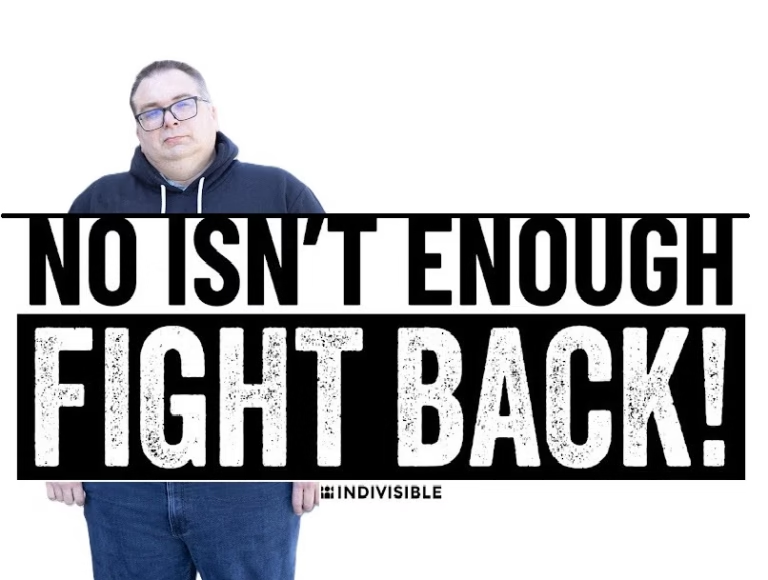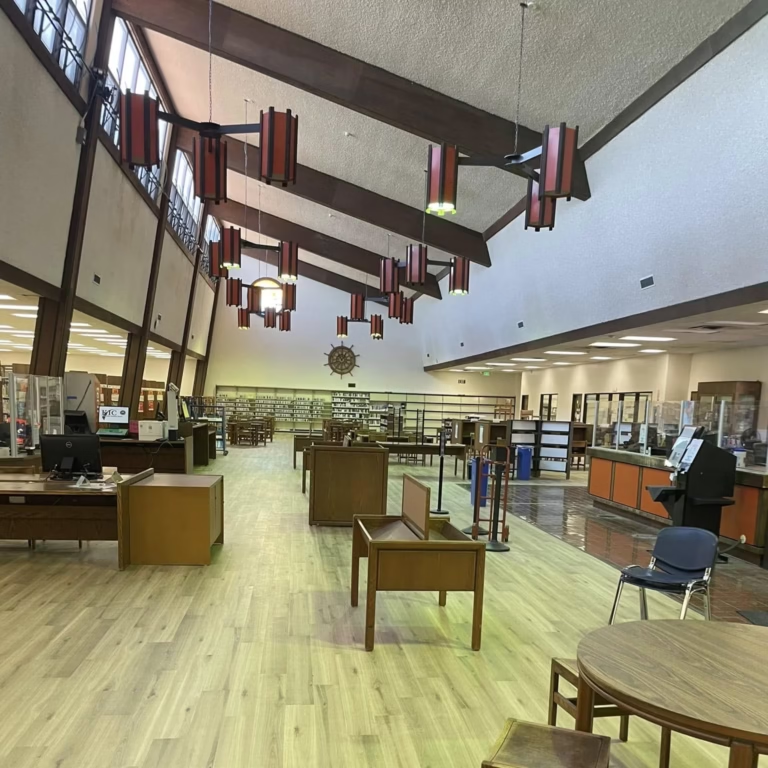April 5 could be a day that changes history. As Trump and Musk have taken a wrecking ball to American democracy — illegally firing workers, closing agencies, canceling contracts, deporting green card holders and other innocents, and extorting tens of millions of dollars from perceived enemies — elite institutions (Congress, media outlets, universities, law firms, etc.) have been betraying their democratic commitments at breakneck speed. Which leaves mass resistance as democracy’s last line of defense.
It’s been spreading like wildfire, with protests happening at double the level of 2017, yet the corporate media’s more subservient posture has significantly obscured the depth and breadth of the resistance.
But that could change dramatically on April 5, when “Hands Off!” demonstrations are planned in more than 600 locations across the country, with Downtown LA as one of six anchor city protests. The Pershing Square rally starts at 4 p.m., with a march to City Hall at 5, where the main rally lasts until 8.
Earlier local events in Torrance and Lakewood start at noon — two of 20+ such events in the Southern California region. It’s the fourth nationwide protest mounted or backed by the 50501 movement, which began on Reddit in late January and has seen each successive protest grow substantially larger. There are more than 120 partner organizations this time, most notably Indivisible, which is organizing both local events.
“The rationale behind this ‘Hands-off’ umbrella is really smart because there are so many areas that are being attacked,” said Melanie Jones, of Indivisible San Pedro, which is working with Torrance. “People respond according to their own experience and their own vulnerability. So this allows for a lot of people with different primary issues to come together.”
“The Trump administration and Elon and DOGE are putting their hands into everything … everything from Social Security and Medicare, Medicaid, and trans and LGBTQ rights, and it runs the gambit. So the hands-off theme, I think appeals to a lot of people,” said Kenny Johnson, lead organizer in Torrance, with Indivisible South Bay. “But I think democracy and what it means for us to be America is just a universal concern.”
“Hands-off our democracy, hands-off healthcare, hands-off woman’s rights, hands-off our future … hands-off — there’s a whole list,” said Hunter Dunn, 50501’s Southern California spokesman, a lead organizer of the Downtown LA march and protest.
“The thing that’s most concerning and motivating for people is just the legality of what’s happening,” Ashley Craig, with Long Beach Indivisible, stressed. “It’s the overreach and the illegality. Because the vast majority of what the Trump Administration is doing is not allowable. It’s not constitutional. That’s why the courts are ruling against him very consistently. And then he’s choosing to ignore the courts.”
There are specific concerns, Craig noted — trans rights, LGBTQ rights, reproductive rights, voting rights, immigration, the climate crisis — but, “The thing that’s gotten everyone so incredibly concerned and fired up and motivated is the fact that this administration is doing things — this is a constitutional crisis — they’re doing things that have never, never been done before and they’re breaking everything.”
Heather Rodriguez, with Lakewood Indivisible, cited attacks on the vulnerable — deportations of innocents, defunding education, threats to Social Security, etc. Deportations were her greatest concern. “He [Trump] tried to claim that people [deported] would be only criminals. Like the worst of the worst would be deported. And I knew that that’s not going to be right,” she said. Nobody objects to deporting dangerous convicted criminals, she noted, but we know that won’t be who’s targeted. “What’s the easier target?” she asked. “Is the easier target going to be somebody who’s part of a gang that might be armed or underground, hidden? Or was the easy target going to be, you know that the mom with a bunch of kids who works at your local store and takes the kids to school and goes to church and has a solid address?” The answer has been obvious and unsurprising.
And then there’s Social Security.
“Lakewood has a lot of seniors that live here. A lot of them rely on Social Security,” Rodriguez noted. “I think it’s offensive that the Social Security head that Trump has selected was talking about how people wouldn’t miss it — how the only people who complain are going to be the fraudsters and scammers. That’s insane to me,” she said. “It’s just so important that we are treating the people that are the most vulnerable as best as we can. That’s how you define a society.”
“We have to stand up for the things we care about about this country and we have to fight for them harder than they’re being attacked because we have less power, less institutional power right now,” said Dunn.
The “Cutting Waste” Big Lie
The idea that the federal workforce is wasteful and bloated may be rhetorically popular with the right, but it can’t stand up to scrutiny. The federal workforce is about the same size it was in 1970 when the U.S. population was only about 60% of what it is today. It was about the same size a decade later, when Ronald Reagan appointed the waste-cutting Grace Commission — which Paul Krugman noted in December, “assembled a staff of nearly 2,000 business executives divided into 36 task forces, who spent 18 months on the job” but “mostly came up empty” in finding anything to cut.
So it’s no surprise that Musk and DOGE are cutting flesh and bone, not fat and that millions are suffering as a result.
But more than that, the chaos Musk has caused at the IRS could result in the loss of a staggering $500 billion in tax revenue this year, according to a March 22 report by the Washington Post. That’s almost five times more than what he’s claimed to save and almost 60 times more than what’s been verified. The initial plan is to cut 20% of IRS staff, with the largest cuts to tax compliance, resulting in far more fraudulent tax evasion by wealthy individuals and corporations. In short, DOGE is dramatically increasing “waste, fraud, and abuse” at the highest levels of private wealth.
One reason it might seem that the government can be cut without consequence is that much of what the government does is invisible to most people — even those who directly benefit from many programs have no idea that they do. This was revealed more than a decade ago in Suzanne Mettler’s 2011 book, The Submerged State, which sheds an illuminating light on what’s happening now.
“For decades, Americans have been relying on the federal government more than ever in their daily lives but appreciating it less and less,” Mettler told Random Lengths. “This ‘government-citizen disconnect,’ as I call it, is paradoxical. In part, it flows from the anti-government ethos of our times, and the way conservatives have been framing issues since the 1980s,” she said, but, “It also emanates from the hidden nature of many government benefits. Some are part of what I call the ‘submerged state,’ channeled through the tax code or private organizations, such that Americans don’t actually realize that the government helped them out. And then there are the myriad ways that government improves our lives that are easy to take for granted, both because government (unlike businesses) doesn’t advertise its accomplishments, and because the services it provides, activities it encourages, and rules it imposes benefit us collectively rather than on an individual basis.”
Classic examples are things Musk is cutting, she noted, “the NIH funding for scientific research, that has led to great improvements in our abilities to prevent or treat diseases. Or our ability to count on the National Weather Service for reliable weather reports. Or the role of the Department of Education in tracking how well American students in different parts of the country are learning.”
So, Mettler concluded, “When Americans tell pollsters that they don’t trust government, my guess is that they don’t really mean that they want all of those services and many others to be eviscerated. And yet, that’s exactly what’s happening.”

Fighting Back
Three months ago, before DOGE began eviscerating the government, this was all very abstract. It was mostly people like Mettler who understood this. But now a substantial majority of ordinary Americans understand as well. They understand it viscerally when everything from National Parks to the Post Office to the National Weather Service to Social Security is suffering from slash-and-burn mass firings wreaking havoc with their ability to function.
There’s been a massive wave of organizing in response, with more than 250 Tesla Takedown demonstrations the weekend before April 5 as the latest example. All the leaders we spoke to were either already organizing with Indivisible or joined up in response to Trump’s re-election. But they’ve seen dramatic growth ever since.
Johnson was originally involved with Indivisible in 2020, but “was not super active” and “kind of got complacent” after Joe Biden’s election but “with Trump winning reelection it got me back into being involved.”
Rodriguez reacted similarly. “When Trump was reelected back in November, I felt very strongly that I needed to get more involved,” citing parallels to what happened in 1930s Germany. She did research into different groups and was most impressed with Indivisible’s guide. “I marched with Black Lives Matter, but I’ve never led an organization like this before. So starting from scratch was a little bit intimidating and it was nice to know that we had that support nationally,” she explained.
In Long Beach, “We started as a group of like three or four people and now were well over 200. … That was in the end of November,” Craig said. “I think it is growing exponentially,” she added. “I’ve been involved in activism my whole life, so you know having me be involved, that doesn’t mean much. … What’s unique and where the ball is rolling faster, the snowball is getting bigger, is the number of people who’ve never been engaged before getting engaged and that’s increasing by the day.”
While Musk spent a quarter billion dollars to help elect Trump, he and other Trump supporters still try to dismiss mass opposition as being funded by George Soros — the right’s favorite Jewish boogie-man figure. But when I asked Rodriguez about money from Soros, she said she hadn’t seen any.
“We have to pay for our meeting space, and so I asked everybody for donations if they feel like it,” she said. “Indivisible does provide some grants, fairly small,” for specific purposes. “But no, we don’t have any corporate sponsors. We don’t have any shadowy figures paying us.”
Quite the opposite. “None of us are paid,” she said. “A lot of us are contributing money out of our own pockets just to try to do something, to fund these meeting locations, to get people to locations who don’t have rides. Even just like making signs costs money.”
And — as befits any anti-authoritarian movement — they’re fighting the Trump/Musk agenda in multiple ways. A lot of the Lakewood chapter’s energy goes into supporting other groups and initiatives. On March 19, for example, they turned out at local schools in support of the National Educators Association national walk-in day. “We had a couple of people stand out front of the schools with signs just saying support spending for schools, and we need IEP [individualized education programs], we need dual immersion, we need diversity. … And we walked into the school offices and gave them goodies like cookies and flowers and a thank-you card just to show our support.”
More broadly, “We’re trying to support each other’s groups as a whole,” she said.
Building a broad local support base is crucial for long-term movement building, which is why local demonstrations provide a vital complement to the national anchor city events. Pre-event signups have Torrance organizers concerned about space. “A lot of the people who have signed up are not on our mailing list,” Johnson said, which affirms their decision. South Bay people, “need to know that they’re in a community that agrees with them,” he said. “People who are paying attention need to see it, and if it happened in downtown LA and they’re only seeing it on the 6 o’clock news … that feels distant. So that’s why we really want to do something local.”
Indivisible groups also have a long history of electoral involvement. Nationally, Democrats had run 10 points ahead of November in special elections through March 15, when they pulled an upset in a Pennsylvania Senate in Lancaster County, a county that has voted Democrat at the presidential level just once since 1856. That result spooked Trump so badly that he withdrew his nomination of New York Congresswoman Elise Stefanik to be UN ambassador, fearing that her seat could be lost in a special election, even though she won re-election in November by 24 points.
The Wisconsin Supreme Court election on April 1 is another key race — which Musk has spent more than $20 million on. Democrat Susan Crawford won decisively by 10 points.And there are two Florida special elections for the House on the same day, which swung 6 and 22 points away from the GOP since November. Those elections have been a focus of attention for Long Beach Indivisible, Craig said. “We have been phone banking, we’ve been sending tons of postcards to Wisconsin, into the two Florida races. And I think that we’re all kind of looking at that with bated breath because I think what happens on April 1 is really going to be indicative.”
While winning elections is vital to block an authoritarian take-over — and Trump is already trying to orchestrate sweeping voter-suppression measures ahead of the 2026 mid-terms — they are clearly not enough.
A positive vision is needed as well — a fact reflected in the massive crowds attending Bernie Sanders’ “Fighting Oligarchy Tour” where he’s recently been joined by Rep. Alexandria Ocasio-Cortez.
“This moment, this movement is bigger than these next four years. It’s bigger than Congress, hell, it’s even bigger than the Oval Office. Right here, around the country, we can start a great American renewal today,” Dunn said. “It’s not just about saying we’re against this, it’s also trying to provide a constitutive positive vision for the future. Because there are reasons why the country is here right now and if we can reclaim our democracy we can do things about it so that this never happens again,” he said. “We can establish universal healthcare and economic protections and union protection so that the average American worker isn’t being stepped on enough by the big corporations that they will fall to a populist right-leaning candidate who is lying to them and promising things they won’t deliver.”













